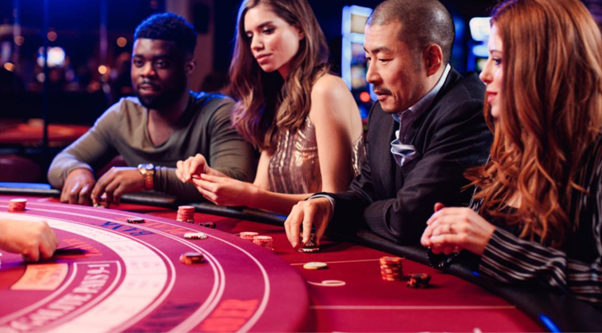But what actually makes someone want to risk their money, and what psychological mechanisms are at work here? To answer these questions, we need to delve deeper into the human psyche and understand what makes gambling tick. It is an interplay of a wide range of factors, from individual motives to social influences. Exploring these complex dynamics is essential to fully understanding the phenomenon of gambling. Furthermore, gambling also has cultural and economic significance, which adds depth to the consideration. In many societies, gambling is not only seen as a leisure activity, but also as a symbol of adventure, risk and hope for a better life. These multi-layered aspects require detailed analysis.
The role of emotions in gambling
A central aspect of gambling is the emotional stimulus it triggers. Adrenalin, dopamine and endorphins play a crucial role here. The feeling of being able to take a risk and expect a reward causes the brain to enter a highly active state. Even if you lose, there is always the hope of winning next time, which can drive the player to keep playing. These emotional highs and lows feel like a rollercoaster ride to many people, who seek them out again and again. One particularly exciting question is how such emotional patterns can affect the behaviour and personality development of the players over a longer period of time.
The psychological bond often arises from intermittent rewards – that is, winnings occur unpredictably and at irregular intervals. This unpredictability stimulates the brain and activates a ‘reward system’ that causes feelings of happiness. Scientific studies illustrate this connection, which can be used to explain the emotional reactions of players. A deeper look into the psychology of gambling shows how strongly emotional attachment is anchored in gambling. According to this, it is above all the hope of winning big that drives people, even when they are aware of the losses. Interestingly, this mechanism seems to be universal and affects people from a wide range of social and cultural backgrounds.
Another factor is what is known as thrill-seeking, or the search for the rush of insecurity. Some people feel alive in risky situations and enjoy the supposed control in an otherwise uncontrollable environment. This emotional thrill motivates many to return to the casino or to online offers again and again. Particularly in the digital era, in which online casinos are accessible around the clock and without location, this impulsive side is further reinforced. However, anonymity and quick access also open doors to problematic gaming behaviour, which can negatively affect everyday life and quality of life. Here, a conscious understanding of the mechanisms behind the fascination of gambling is crucial in order to recognize risks at an early stage and take countermeasures.
Group dynamics and social influences
The social environment also plays a significant role in the attraction of gambling. In particular, gambling often develops an intense dynamic in a community. Group activities, shared experiences and the exchange of winnings or losses strengthen the bond between the players. Such group phenomena are particularly evident in societies where social contacts have a high priority. Gambling in a social setting is often perceived as a harmless pastime, although the risks remain. However, the social aspect extends not only to private or informal gatherings, but also to organized events and modern marketing strategies.
However, the social aspects not only include the dynamics of groups, but also the advertising and the presentation of slot machines and gambling offers in the media. Advertising often conveys an idealized idea of gambling that has little to do with reality. Instead, it creates a glamorous atmosphere that makes winnings appear easy to achieve. In particular, an offer such as Lolly Spins Casino creates an impression of security and respectability, which can lower the barrier to playing for the first time. This portrayal of security and comfort often obscures the risks associated with regular gaming. It is therefore important to be critical of such representations and to recognise the psychological tricks behind the advertising.
Health effects and psychological challenges
However, the positive aspects of gaming should not make us ignore the health and psychological effects of gambling. Gambling addiction often develops gradually and is not initially recognized as a problem by those affected. Scientists have shown that excessive gaming can cause lasting changes to the brain. Certain regions, particularly those responsible for impulse control, increasingly lose activity. This leads to those affected having difficulties regulating their behaviour, which further intensifies the vicious circle of gambling.
Healthy habits and a conscious lifestyle are beneficial for staying mentally fit. However, finding the right balance is often a particular challenge for those addicted to gambling. Inspiration and tips for staying healthy and fit can be a valuable contribution to personal well-being and an introduction to prevention. Preventive measures and conscious handling of gambling are crucial steps in minimizing risks and maintaining control.
The long-term health consequences that arise depend heavily on the individual’s way of playing. Often, problems such as anxiety disorders, chronic stress and insomnia arise that can significantly affect the lives of those affected. It is therefore important that those affected do not remain alone and can take advantage of offers of help. Support in the form of advice centers, such as those available in many cities, or sharing experiences in self-help groups can be a decisive turning point. Those who proactively deal with their situation can often avoid more profound problems. Prevention and education therefore play a central role in raising awareness of the dangers of gambling at an early stage and protecting people in the long term. In addition, society as a whole should be better informed about the negative consequences of gambling in order to minimize the stigma associated with gambling addiction and to enable an open discussion.
FAQ: The Psychological Aspects of Gambling
- What motivates people to gamble? People gamble for a variety of psychological reasons, including the thrill of risk, the hope of winning big, and the emotional highs and lows that gambling can trigger. Social and cultural factors also play a significant role, as gambling is often seen as a form of adventure and an escape from everyday life.
- How do emotions influence gambling behavior? Emotions such as excitement, adrenaline, and the desire for reward drive gambling behavior. The unpredictability of wins creates a psychological bond with the activity, as intermittent rewards stimulate the brain’s reward system. This emotional rollercoaster often keeps players returning, despite potential losses.
- What role does thrill-seeking play in gambling? Some individuals are attracted to the thrill of risky situations, which gambling offers. This search for excitement, along with the illusion of control, motivates people to keep gambling. The accessibility of online casinos further amplifies this impulsive behavior, making gambling more appealing and potentially leading to problematic gaming patterns.
- How do social influences impact gambling? Gambling often thrives in social environments where shared experiences, group dynamics, and community bonding are present. The influence of friends, family, or social circles can shape attitudes towards gambling, making it seem like a harmless pastime. However, this social acceptance can sometimes obscure the risks involved.
- What is the impact of advertising on gambling behavior? Gambling advertisements often portray an idealized image, making it seem easy to win and creating an atmosphere of comfort and security. These representations, like those seen in offers such as Richard Casino’s no deposit bonus, can lower barriers to entry for new players and mask the potential risks associated with frequent gambling.
- What are the psychological challenges associated with gambling? Over time, gambling can lead to changes in the brain, particularly in areas responsible for impulse control. This can result in difficulties managing behavior and an increased risk of developing addiction. The emotional highs and lows can also impact mental health, leading to issues such as anxiety, chronic stress, and insomnia.
- How can gambling addiction be prevented or managed? Prevention and education are key to avoiding gambling addiction. Recognizing the psychological mechanisms behind gambling and being mindful of personal behavior are essential steps in minimizing risks. Seeking support through counseling, self-help groups, or professional advice centers can help individuals regain control over their gambling habits.
- What are the long-term health effects of gambling? Chronic gambling can lead to various mental health issues, including anxiety, stress, and sleep disturbances. Long-term gambling can also negatively impact relationships, finances, and overall quality of life. It is crucial for individuals to seek help and adopt healthier coping mechanisms to manage their gambling behavior.
- How can society address the risks associated with gambling? Raising awareness about the dangers of gambling and reducing the stigma associated with gambling addiction is important for encouraging open discussion. Education on the psychological and health risks of gambling can help people make informed choices and foster a supportive environment for those struggling with addiction.



